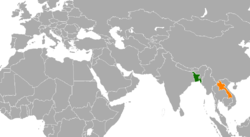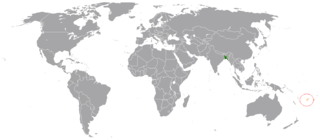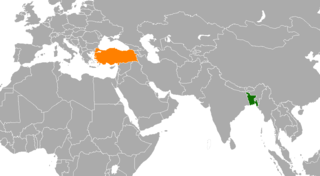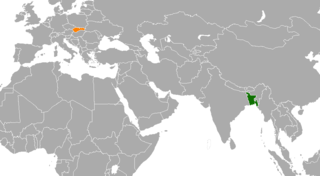 | |
Bangladesh | Laos |
|---|---|
Diplomatic relations between Bangladesh and Laos officially began in 1988. [1] Neither country has a resident ambassador.
 | |
Bangladesh | Laos |
|---|---|
Diplomatic relations between Bangladesh and Laos officially began in 1988. [1] Neither country has a resident ambassador.
Bangladeshi Prime Minister Sheikh Hasina paid an official visit to Vientiane in 2012. [2]
Bangladesh and Laos have been supporting each other at various international forums. In 2012, Laos supported Bangladesh's inclusion in ASEM. [3] They are both part of China's One Belt One Road Initiative. [4]
Bangladeshi medicines, cement, ceramic, light engineering products, leather, steel and agro-products have been identified as products with huge demand in Laos. Lack of proper transport links has been one of the major problems for expanding the bilateral trade between the two countries. Both the countries are working towards solving the transport problem and are in process to join the Asian Highway Network which would solve the problems. [5] [6]

Bangladesh–India relations are the bilateral relations between the People's Republic of Bangladesh and the Republic of India, both of which are South Asian neighbours. Diplomatic relations between the two countries formally began in 1971 with India's recognition of an independent Bangladesh following India's military intervention helping Bangladesh secure independence following the 1971 India-Pakistan War. On 6 December, Bangladesh and India celebrate Friendship Day commemorating India's recognition of Bangladesh and the continued friendship between the two countries.

The Bay of Bengal Initiative for Multi-Sectoral Technical and Economic Cooperation (BIMSTEC) is an international organisation of seven South Asian and Southeast Asian nations, housing 1.73 billion people and having a combined gross domestic product of US$5.2 trillion (2023). The BIMSTEC member states – Bangladesh, Bhutan, India, Myanmar, Nepal, Sri Lanka, and Thailand – are among the countries dependent on the Bay of Bengal.

General elections were held in Bangladesh on 29 December 2008. The two main parties in the election were the Bangladesh Nationalist Party (BNP), led by Khaleda Zia, and the Bangladesh Awami League Party, led by Sheikh Hasina. The Bangladesh Awami League Party formed a fourteen-party Grand Alliance including Ershad's Jatiya Party, while the BNP formed a four-party alliance which included the Islamist party Jamaat-e-Islami. The election was originally scheduled for January 2007, but it was postponed by a military-controlled caretaker government for an extended period of time.

Bangladesh–Iran relations are the bilateral relations between Bangladesh and Iran. Despite not having any major deals or any big kind of trade, the representatives of both nations have called for expanding bilateral economic relations. Both are members of the OIC and the Developing 8.

Pakistan and Bangladesh are both South Asian Muslim-majority countries. Following the end of British rule in India, the two countries formed a single state for 24 years. The Bangladesh Liberation War in 1971 resulted in the secession of East Pakistan as the People's Republic of Bangladesh. Pakistan recognized Bangladesh in 1974. Today, bilateral relations between Bangladesh and Pakistan are considered to be cordial.

Salman Fazlur Rahman is a Bangladeshi businessman, and a member of the Jatiya Sangsad. He is the Private Industry and Investment Adviser to Bangladesh Prime Minister Sheikh Hasina in the rank of a cabinet minister. Earlier, he served as the private sector development affairs adviser to her. He was ranked 1685th on the list of billionaires in the world published by Beijing-based Hurun Gobal in 2017. He is the vice chairman of BEXIMCO Group, one of the largest conglomerates in Bangladesh. He was the president of several trade bodies including Association of Television Channel Owners (ATCO).

The Byelorussian Soviet Socialist Republic recognized Bangladesh's independence on 24 January 1972. Official diplomatic relations between Bangladesh and Belarus were established in 1992. Neither country has a resident ambassador.

Bangladesh–Kazakhstan relations refer to the bilateral relations between Bangladesh and Kazakhstan. The Bangladeshi President Iajuddin Ahmed said that the two countries enjoy cordial diplomatic relations and are working towards strengthen it further. Both the countries are members of Organisation of Islamic Cooperation. Neither country has a resident ambassador. In 2009, Kazakhstan announced it intended to open a consulate in Dhaka.

Bangladesh–Trinidad and Tobago relations refer to the bilateral relations between Bangladesh and Trinidad and Tobago. Neither country has a resident ambassador.

Bangladesh–Fiji relations refer to the bilateral relations between Bangladesh and Fiji. Fiji recognized Bangladesh on January 31, 1972. Diplomatic relations between the two countries were officially established in 2003. Both countries are members of the Commonwealth of Nations. In 2013, the Foreign Minister of Bangladesh urged the Fijian government to steer the country towards democracy.

Bangladesh–Turkey relations are the bilateral relations between Bangladesh and Turkey. Both countries are members of the Organisation of Islamic Cooperation. Turkey has an embassy in Dhaka and Bangladesh has one in Ankara and a consulate in Istanbul.

Bangladesh–Nigeria relations refer to the bilateral relations between Bangladesh and Nigeria. Bangladesh has a high commission in Abuja. Nigeria used to have a high commission in Dhaka, which is now closed. Nigeria is represented by a non-resident high commissioner in New Delhi. Both Bangladesh and Nigeria are members of international organizations including the Organisation of Islamic Cooperation, Commonwealth of Nations and Developing 8 Countries.

Bangladesh–Canada relations are the foreign relations between Bangladesh and Canada established 1972. Canada is represented through its High Commission in Dhaka and Bangladesh is through its High Commission in Ottawa. Both countries are members of the Commonwealth of Nations and the United Nations. Bangladesh currently receives ~$110 million from Canadian official development assistance per year as of January 2014. It is estimated that around 36,000 (2012) Bangladeshi people live in Canada, primarily in cities like Toronto, Vancouver, Montreal, Calgary, Edmonton, and Ottawa.

Bangladesh–Slovakia relations refer to the bilateral relations between Bangladesh and Slovakia. Neither country has a resident ambassador. The diplomatic relations officially started in 1993.

Bangladesh–Italy relations relate to the foreign relationship between Bangladesh and Italy. Bangladesh maintains its embassy in Rome while Italy has an embassy in Dhaka.

Bangladesh–France relations relate to the foreign relationship between Bangladesh and France.

The Belt and Road Initiative, known in China as the One Belt One Road sometimes referred to as the New Silk Road, is a global infrastructure development strategy adopted by the Chinese government in 2013 to invest in more than 150 countries and international organizations. The BRI is composed of six urban development land corridors linked by road, rail, energy, and digital infrastructure and the Maritime Silk Road linked by the development of ports.

Bangladesh–Vietnam relations refer to the bilateral relations between Bangladesh and Vietnam.

The Boten–Vientiane railway is the Lao section of the Laos–China Railway (LCR), running between the capital Vientiane and the northern town of Boten on the border with Yunnan, China. The line was officially opened on 3 December 2021.

Bangladesh–Belgium relations refers to bilateral relations between Bangladesh and Belgium. Bangladesh has a resident ambassador in Brussels who is also the ambassador of Bangladesh to Luxembourg. Belgium has a non resident ambassador in New Delhi.